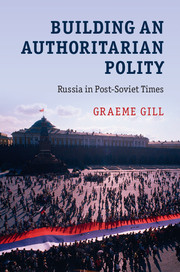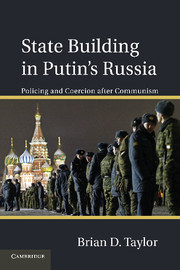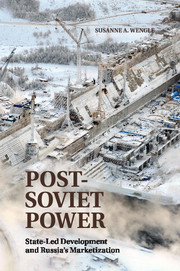Building an Authoritarian Polity
Russia in Post-Soviet Times
$99.99 (P)
- Author: Graeme Gill, University of Sydney
- Date Published: February 2016
- availability: In stock
- format: Hardback
- isbn: 9781107130081
$
99.99
(P)
Hardback
Other available formats:
Paperback, eBook
Looking for an examination copy?
If you are interested in the title for your course we can consider offering an examination copy. To register your interest please contact [email protected] providing details of the course you are teaching.
-
Graeme Gill shows why post-Soviet Russia has failed to achieve the democratic outcome widely expected at the time of the fall of the Soviet Union, instead emerging as an authoritarian polity. He argues that the decisions of dominant elites have been central to the construction of an authoritarian polity, and explains how this occurred in four areas of regime-building: the relationship with the populace, the manipulation of the electoral system, the internal structure of the regime itself, and the way the political elite has been stabilised. Instead of the common 'Yeltsin is a democrat, Putin an autocrat' paradigm, this book shows how Putin built upon the foundations that Yeltsin had laid. It offers a new framework for the study of an authoritarian political system, and is therefore relevant not just to Russia but to many other authoritarian polities.
Read more- Explains the strong continuities between the Yeltsin and Putin regimes
- Proposes a new framework for understanding authoritarian regimes and how they work
- Provides an accessible account of a complicated and problematic period in Russia's historical development
Reviews & endorsements
"Theoretically informed and based on the author’s intimate knowledge of post-Soviet politics, Graeme Gill’s Building an Authoritarian Polity is bound to shape debates over the nature of the regime that is emerging under Putin as well as broader discussions in comparative politics."
M. Steven Fish, University of California, BerkeleySee more reviews"In this path-breaking study of Russia’s post-communist transition, which provides a tour de force of the theoretical literature on problems of democratization and the factors that enhance the stability of authoritarian regimes, Graeme Gill rightly brings the role of political elites and the state back to centre stage. In five beautifully crafted chapters, which cover all the key areas of the scholarly debate, Gill clearly demonstrates that it was the state building activities of Yeltsin and Putin that have been the single most important factor in explaining the construction and maintenance of Russia’s authoritarian polity."
Cameron Ross, University of Dundee"A bold reconceptualization of contemporary Russia as a fully authoritarian polity. And more than this, a detailed and compelling demonstration of the various ways in which it is sustained. It is hard to think of a better guide to the contemporary Russian system: students will welcome the clarity of its exposition, and scholars will welcome an account that engages convincingly with current debates in comparative politics without neglecting "Russia as such". A fine achievement."
Stephen White, University of Glasgow"Graeme Gill has done it again. He tackles a complex set of contemporary Russian political, institutional, and elite issues and illuminated them with thoughtfulness and aplomb. Carefully overviewing more than two decades of complex domestic political developments, Gill offers the reader a comprehensive and compelling analysis: an analysis that is both nuanced and accessible, and one that represents a definitive study of the construction of a post-Soviet Russian authoritarian polity. A milestone study that merits serious attention and reflection."
John P. Willerton, University of Arizona"Gill presents a persuasive case that authoritarianism in Russia is a product of the ways in which the regime structures political activity and the methods by which it has structured itself … Highly recommended."
J. W. Peterson, Choice'Gill diagnoses a key Russian problem as the tension between two largely incompatible operating principles: the bureaucratic and the personalist.' Survival: Global Politics and Strategy
'In his knowledgeable, theoretically informed study of authoritarian resilience in Russia, Graeme Gill does an excellent job in identifying the factors that have led to the stabilization of nondemocratic rule under Putin.' Thomas Sherlock, The Russian Review
'Graeme Gill has written a concise, readable, yet remarkably detailed account of the construction of contemporary Russia’s particular brand of authoritarianism, the linchpin of which is its charismatic and powerful president. Gill explains contemporary Russia not as the result of failed democratization, but as the result of elite-driven state-building in the absence of an ideological template with which to coordinate competing interests and centers of power in Russia’s massive federal system.' Josephine T. Andrews, Slavic Review
Customer reviews
Not yet reviewed
Be the first to review
Review was not posted due to profanity
×Product details
- Date Published: February 2016
- format: Hardback
- isbn: 9781107130081
- length: 238 pages
- dimensions: 235 x 156 x 16 mm
- weight: 0.46kg
- contains: 13 tables
- availability: In stock
Table of Contents
1. Stability and authoritarian regimes
Part I. Structuring Public Political Activity:
2. Regime and society
3. The party system and electoral politics
Part II. Structuring the Regime:
4. Structuring institutional power
5. Elite stabilization
Conclusion: the Putin system and the potential for regime change.
Sorry, this resource is locked
Please register or sign in to request access. If you are having problems accessing these resources please email [email protected]
Register Sign in» Proceed






